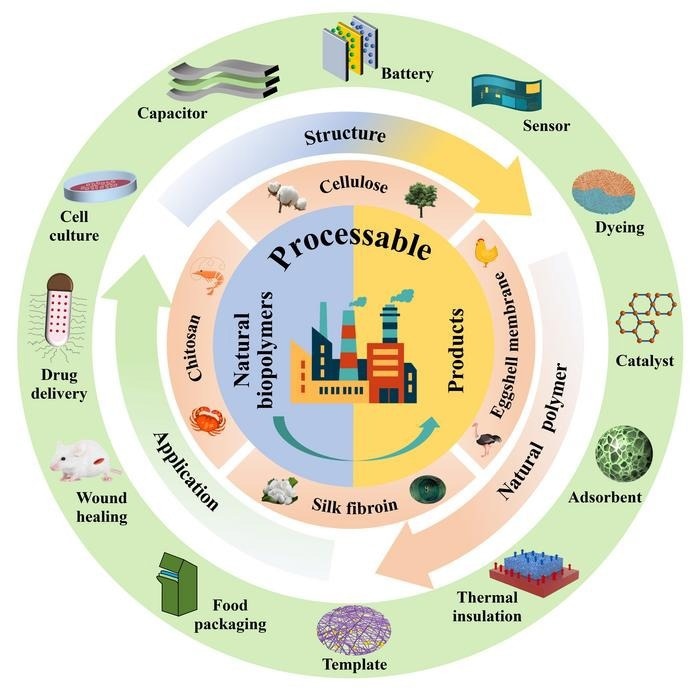Reviewed by Lexie CornerSep 30 2024
A study published in the Science Bulletin examines recent advancements in processable natural biopolymers and their various applications.
 This figure encompasses critical aspects of four processable natural biopolymers: preparation, structure, properties, and diverse applications in biomedical engineering, biosensors, environmental engineering, and energy applications. Image Credit: Science China Press
This figure encompasses critical aspects of four processable natural biopolymers: preparation, structure, properties, and diverse applications in biomedical engineering, biosensors, environmental engineering, and energy applications. Image Credit: Science China Press
Currently, approximately 8 % of fossil fuels are used in polymer production, and this proportion is expected to projected to surge to 20 % by 2050. This mounting demand for polymers, coupled with escalating processing costs, poses a formidable long-term challenge in meeting global polymer requirements. Moreover, the environmental impact of polymer usage, which is exacerbated by inefficient recycling systems and inadequate waste management infrastructure, underscores the pressing need for sustainable alternatives to synthetic polymers derived from fossil resources.
Dr. Haijun He, Associate Professor, Jiangnan University
Growing concerns about the negative environmental and economic effects of depleting fossil resources and petrochemicals have spurred interest in exploring natural biomass as a viable alternative. With biowaste production increasing rapidly, significant focus has been placed on developing cost-effective, eco-friendly functional materials from natural biopolymers.
These biopolymers, known for their sustainability, biocompatibility, and unique hierarchical structures, offer great potential in various applications due to their structural integrity, toughness, and flexibility.
Proteins and polysaccharides, in particular, have gained attention due to their abundance and versatility. However, processing these materials into final products remains challenging, as they possess extensive hydrogen bonding networks and ordered structures from the molecular to nanoscale levels.
Dr. He added, “This necessitates further modifications to enhance processability, such as extraction or isolation.”
Producing natural biopolymers sustainably for various applications has been a long-standing goal.
“Although hundreds of breakthrough studies have been conducted in this field, existing reviews on bio-material advances in environmental engineering and the biomedical field often focus exclusively on the preparation and specific application of individual natural biopolymers with less attention to processability, sustainability, and diverse applications. Our objective is to comprehensively identify and address major material challenges and offer practical solutions to stimulate a material revolution in the domain of functional natural polymers,” Dr. He further noted.
Ph.D. candidates Shuai Guo from the National University of Singapore and Xinhua Liang from Jiangnan University led the study. Professor Swee Ching Tan from the National University of Singapore and Associate Professor Haijun He from Jiangnan University directed the research.
The National Natural Science Foundation of China (52303054), the Natural Science Foundation of Jiangsu Province (BK20231056), the fellowship of China Postdoctoral Science Foundation (2022TQ0123), the Fundamental Research Funds for the Central Universities (JUSRP122003, JUSRP123005), "Taihuzhiguang" Science and Technology Research (fundamental research) Project of Wuxi (K20221007) and Postgraduate Research & Practice Innovation Program of Jiangsu Province (KYCX22_2345) funded the study.
Journal Reference:
Liang, X., et. al. (2024) Recent advancements and perspectives on processable natural biopolymers: Cellulose, chitosan, eggshell membrane, and silk fibroin. Science Bulletin. doi.org/10.1016/j.scib.2024.08.023